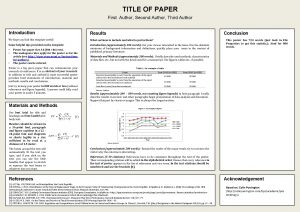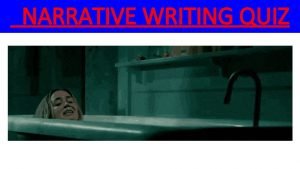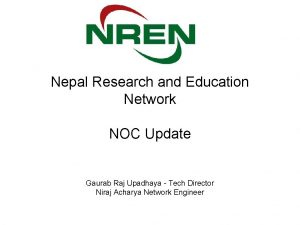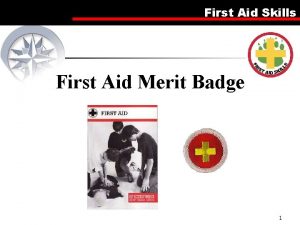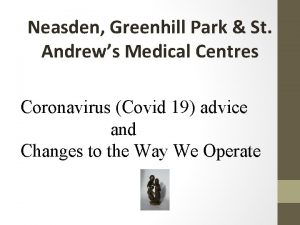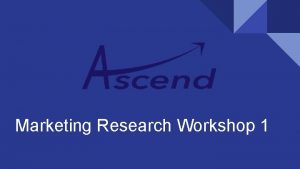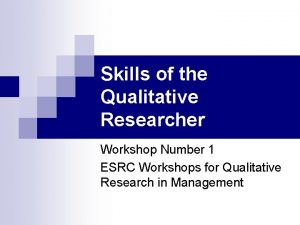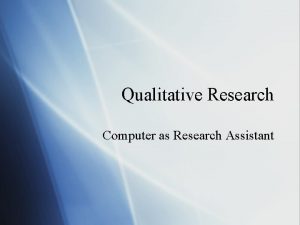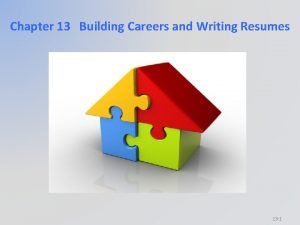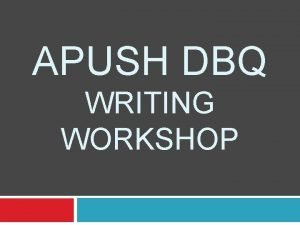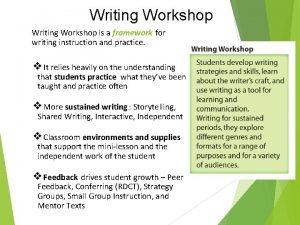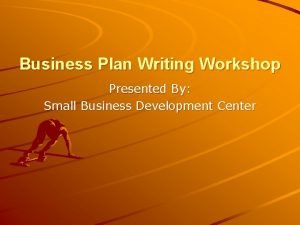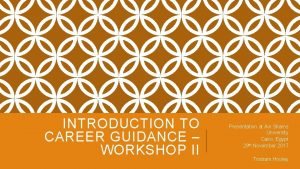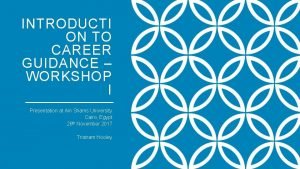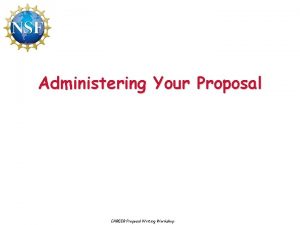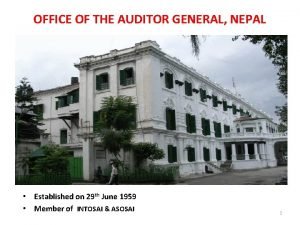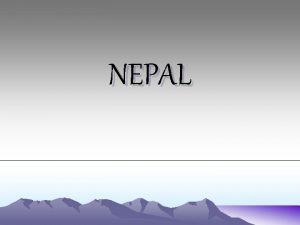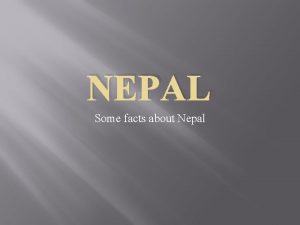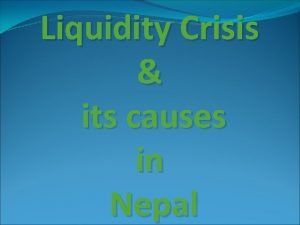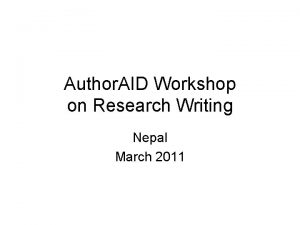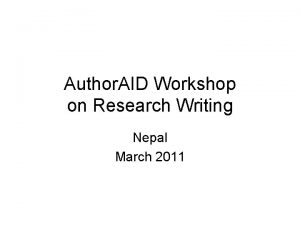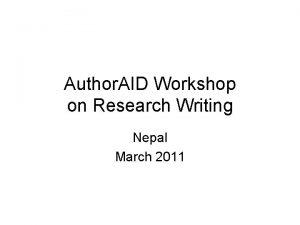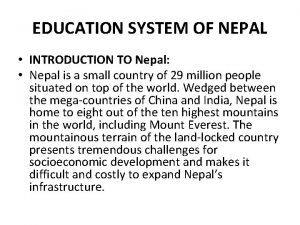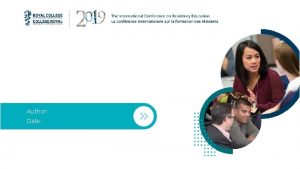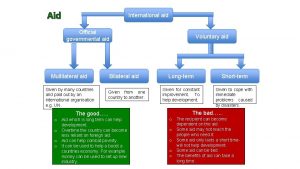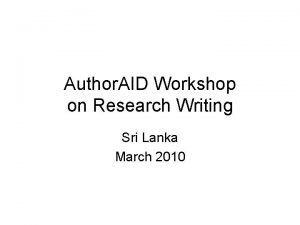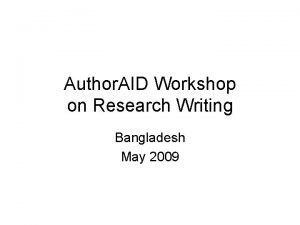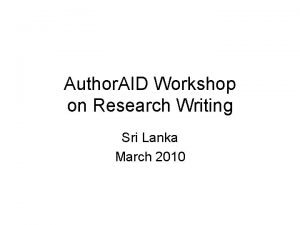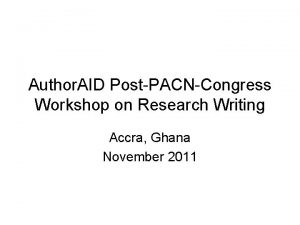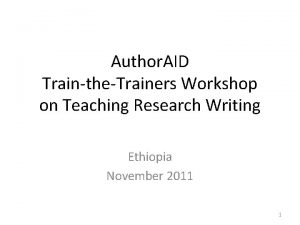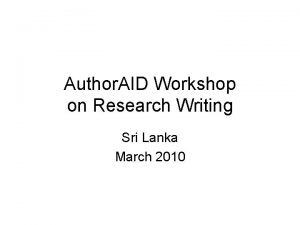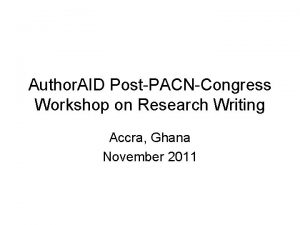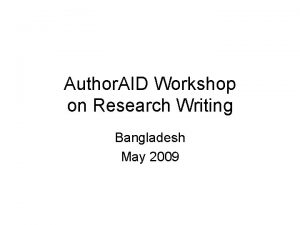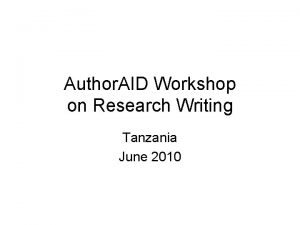Author AID Workshop on Research Writing Nepal March






















- Slides: 22

Author. AID Workshop on Research Writing Nepal March 2011

A Researcher’s Experience Writing and Publishing His First Paper Ravi Murugesan, MS, ELS Training Coordinator Author. AID@INASP

Academic Qualifications • Bachelor of Engineering, University of Madras, India • Master of Science (Electrical Engineering), University of Wisconsin-Madison, USA

Motivation for Research • Research was not a mandatory component of my master’s program in Wisconsin • After completing many courses, I wanted a different experience of graduate studies • I wanted to engage in experimental or laboratory research – Not research that would require extensive modeling or simulations

Getting Started • I spoke to a professor in the applied physics division, for whom I had been a teaching assistant • He put me on an interdisciplinary research project, involving these exciting things: – Biocompatibility – Plasma treatment – Scanning electron microscopy – Testing with human blood

But I Didn’t Know… • Much about plasma physics (my coursework was in computer engineering) – My advisor’s response to my concern: “Do you have a pulse? ” • That there would be a “publication requirement” – I was familiar with research papers, but I knew nothing about scientific writing and publication

Some Months Later… • Lots of results from various experiments • My advisor told me that to graduate I’d have to write a paper for a journal – And I nearly fainted • I began to write. . .

The First Draft • My advisor’s response: “This does not read like a research paper. ” – Pointed out how the paper should be structured, how I should adjust the tone of my writing (I think I wrote like a businessperson and not a researcher), and so on • I revised the tables and figures and rewrote major parts of the text

A Fundamental Problem • Too much data from too many experiments • The data and results did not funnel into a compelling discussion and conclusion • My advisor said that the paper was not “journal worthy”

A Phase of Regret • All that work – doing so many experiments in different labs, learning to use complex equipment, spending so much time writing the paper – was a waste! • Maybe I should have just finished my degree program in the “course option”

A New Beginning • After a break, I resumed work on the project with a new partner; I was the lead researcher this time – The last time, I was working with a more senior student researcher • I was armed with a greater knowledge of scientific writing, following my experience in editing scientific papers – I could see how my initial drafts were far from being journal worthy

Focused Research • Identified the key analysis stage for the research and decided to focus only on that – Not on gathering data from multiple experiments • Planned the experiments in great detail before conducting them • Interacted with researchers in the university who had done similar work • Carefully analyzed the data and compared them with past research

The Writing Stage • Started writing the paper when about 80% of the study was completed • Wrote the paper in the sequence of the sections – Later on, I revised the abstract extensively • Spent a considerable amount of time on the tables, figures, and references

Internal Peer Review • My advisor felt that the draft of the paper held promise • After reviewing it, he sent it to my co-authors (3 or 4 of them) and asked them to review it – All of them had comments; one of them thought that the paper was not good enough and suggested new experiments – My advisor required that I respond to all their comments (it was difficult)

A Pause • We felt that some images from scanning electron microscopy (SEM) were not clear enough, and we had to do the SEM work again – Thankfully, the SEM results did not change!

Success and Setback • My advisor submitted the paper to the journal “Biomaterials” and approved my degree on the same day – He was confident that it would be published • Two weeks later, the editor of the journal rejected the paper! – He felt that it did not fit fully in the journal’s scope and so did not send it for peer review

The Second Option • My advisor had initially wanted to publish the paper in the Journal of Applied Physics (JAP), but he wanted to try out a new journal • But maybe all along the paper was really more about applied physics than biomaterials – All of us in the research group had read many papers in the JAP and it was the standard target journal for the group’s researchers • We reformatted the paper for the JAP and submitted it there

Success (More Real)

A Minor Revision

Paper – Submission and Publication

What I Learned • It’s not easy to get a paper published in a good journal • The greater the accountability in the research project, the better are the chances of success • Publication is not just about good research but about knowing what to include in the paper and how to present it • Familiarity with the target journal is important • The joy of publication success is worth the trials and tribulations!

Thank you!
 First author second author third author
First author second author third author March march dabrowski
March march dabrowski Writing workshop: narrative writing quiz
Writing workshop: narrative writing quiz Nepal research and education network
Nepal research and education network First aid merit badge first aid kit
First aid merit badge first aid kit St andrew medical centre
St andrew medical centre Market research workshop
Market research workshop Qualitative research workshop
Qualitative research workshop Disadvantage of qualitative research
Disadvantage of qualitative research Chapter 13: writing workshop -- résumés
Chapter 13: writing workshop -- résumés Document based question
Document based question Writing workshop framework
Writing workshop framework Business plan writing workshop
Business plan writing workshop Conceptualisatio
Conceptualisatio Career guidance presentation
Career guidance presentation Proposal writing on career guidance workshop
Proposal writing on career guidance workshop Office of the auditor general founded
Office of the auditor general founded Zastava nepal
Zastava nepal Facts about nepal flag
Facts about nepal flag Let live in peace
Let live in peace Liquidity crisis in nepal
Liquidity crisis in nepal Iig nepal
Iig nepal Huraian bentuk muka bumi banjaran himalaya nepal
Huraian bentuk muka bumi banjaran himalaya nepal
